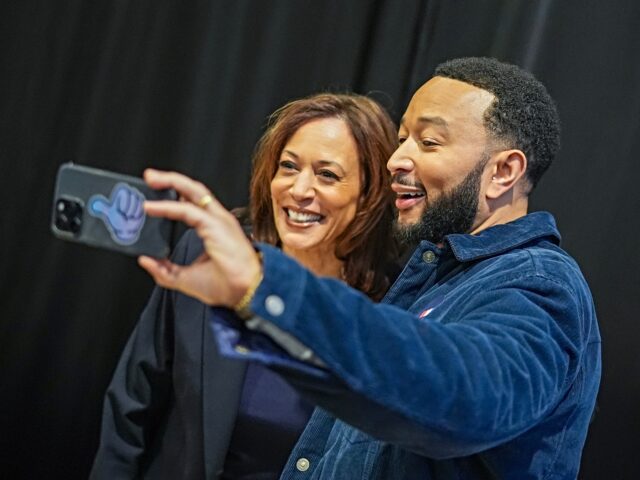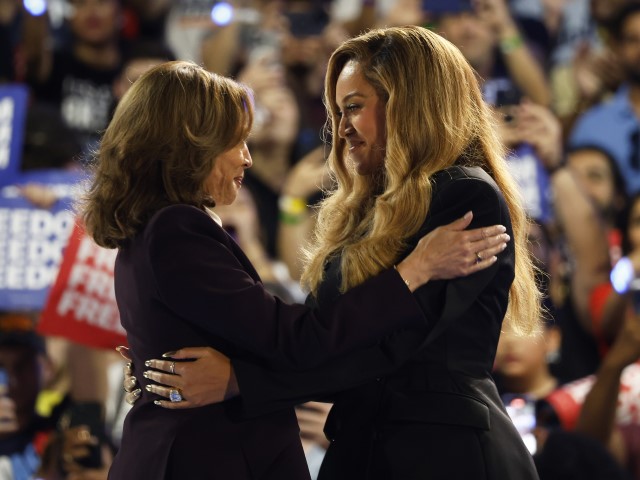Nolte: NYT Admits Celebrity Endorsements ‘May Have Backfired in This Election’
 Andrew Harnik/Getty
Andrew Harnik/Getty
The far-left New York Times admits that at best, all those celebrity endorsements failed to “move the needle” for Kamala Harris and might have even “backfired.”
“Old-School Celebrities Could Not Move the Needle,” reads the headline, followed by this sub-headline: “Hollywood endorsements, once an essential part of a campaign playbook, may have backfired in this election.”
Yeah, why people weren’t interested in what Beyoncé and Oprah and Harrison Ford had to say when eggs cost $4.00 a dozen is a real whodunit.
The Times admits Donald Trump enjoyed the support of Kanye West, Mel Gibson, Jon Voight and Kid Rock, “But by and large, the biggest names in entertainment” backed Kamala Harris, and ”it did not seem to matter much.”
It wasn’t always this way: Celebrity endorsements used to seemingly carry substantial weight, with influential figures like Oprah Winfrey helping to magnify lesser-known candidates (such as Barack Obama in 2008). But that sway seems to have lessened as influencers, onetime “micro”-celebrities and podcasters like Joe Rogan — a former comedian with amorphous, largely libertarian political views — have gained bigger audiences.
“It is actually the more digitally native influencers who are able to leverage their status, content and distribution channels that move the needle,” former Democrat operative Chris Lehane told the Times.
A Republican strategist told the Times that celebrity endorsements tell voters “you’re a liberal, an elitist, and a cultural progressive” and that an “Oprah or Clooney endorsement is the kiss of death in large swaths of the country now.”
“She couldn’t get the endorsement of the Teamsters, but she got the endorsement of Hollywood,” one entertainment media executive told the Times.
Celebrity endorsements stretch back more than a hundred years to when Al Jolson, the biggest star of that era, campaigned with Warren G. Harding. In 1944, two of America’s biggest singing and movie stars campaigned on opposite sides of the fence. Frank Sinatra backed incumbent President Franklin D. Roosevelt. Bing Crosby backed his Republican opponent, Thomas Dewey.
Celebrity endorsements hit their zenith in 1960 when Sinatra engaged his famous Rat Pack (Dean Martin, Sammy Davis Jr., and Peter Lawford) to go all-in for John F. Kennedy (who was also Lawford’s brother-in-law).
So what’s changed? Why would an outfit as far-left as the New York Times begin to openly broach the idea that such esteemed celebrities as George Clooney, Barbra Streisand, Jennifer Lopez, the cast of the Avengers, and The West Wing, might do more harm than good?

Musical artist Beyonce, right, and Democratic presidential nominee Vice President Kamala Harris, left, embrace on stage during a campaign rally Friday, Oct. 25, 2024, in Houston. (Annie Mulligan/AP)
To begin with, it’s true, and this is largely the fault of Hollywood’s celebrity/star culture.
A perfect example is Oprah Winfrey. Back in 2008, Oprah Winfrey was still Oprah Winfrey. Everyone still saw her as their TV pal. The national goodwill was still there, so when she said this Barack Obama guy is something special, people listened. Those days are over. Today, Oprah is seen as just another celebrity, billionaire, and divisive elitist out of touch with the everyday women who made her rich and famous.
And that’s the bottom line — goodwill.
Gary Cooper and Barbara Stanwyck were both outspoken, rock-ribbed Republicans. Humphrey Bogart and Better Davis were both outspoken, die-hard Democrats. But things were different then. Class mattered. Box office mattered. We the customers came first. So while Cooper, Stanwyck, Bogie, and Davis vocally supported causes and candidates, they did so with class so as not to alienate the customers.
What I mean is this… They advocated. That’s it. Vote for Roosevelt! Vote for Coolidge! What they never did was attack those who disagreed. Die-hard Democrats like Edward G. Robinson, James Cagney, and John Garfield never called Republicans Nazis, fascists, racists, repugnant, stupid, or evil. In other words, they never lost the goodwill of half the country. Goodwill can sway voters. Someone you like has influence over you. Someone who calls you a Nazi does not.
And while stars of the past were the elites of their day, they never acted superior. In private, they were likely as egotistical and self-involved as today’s celebrity class. In public, though, their image was entirely different from the smug, entitled, and superior attitude we see from George Clooney, Jane Fonda, Julia-Louis Dreyfus, and Whoopi Goldberg.
Throughout most of celebrity history, Americans like their stars because — although it might have all been an act — in public they were humble, grateful self-effacing, and never took themselves or their fame seriously.
Denzel Washington managed to support Barack Obama without alienating his audience. Why? Because he didn’t call us Nazis. Denzel has class. The same cannot be said for most of the rest. They hate us. They make that clear every time they open their fat mouths. All we’re guilty of is hating them back.
John Nolte’s first and last novel, Borrowed Time, is winning five-star raves from everyday readers. You can read an excerpt here and an in-depth review here. Also available in hardcover and on Kindle and Audiobook.
Source link

